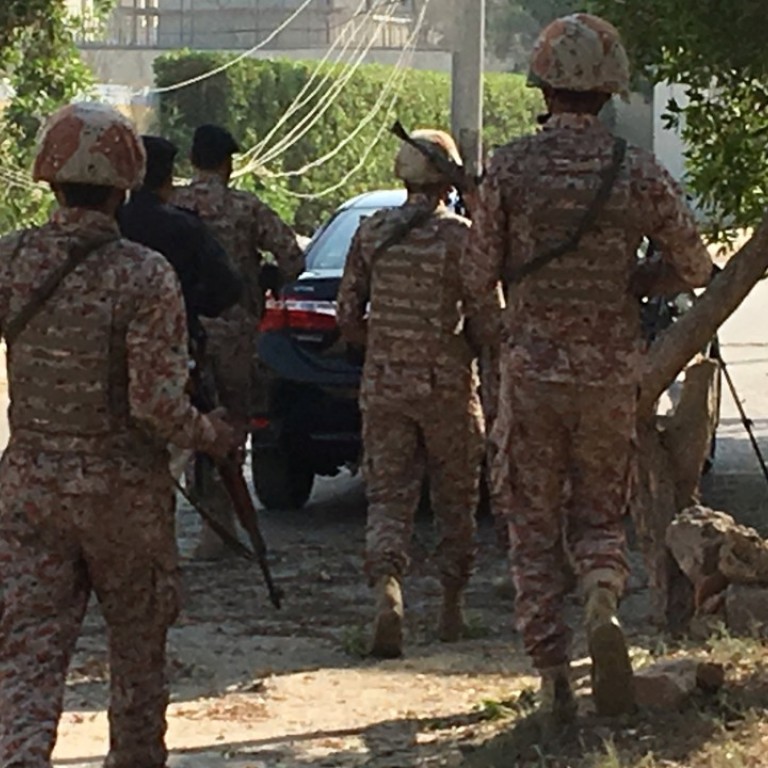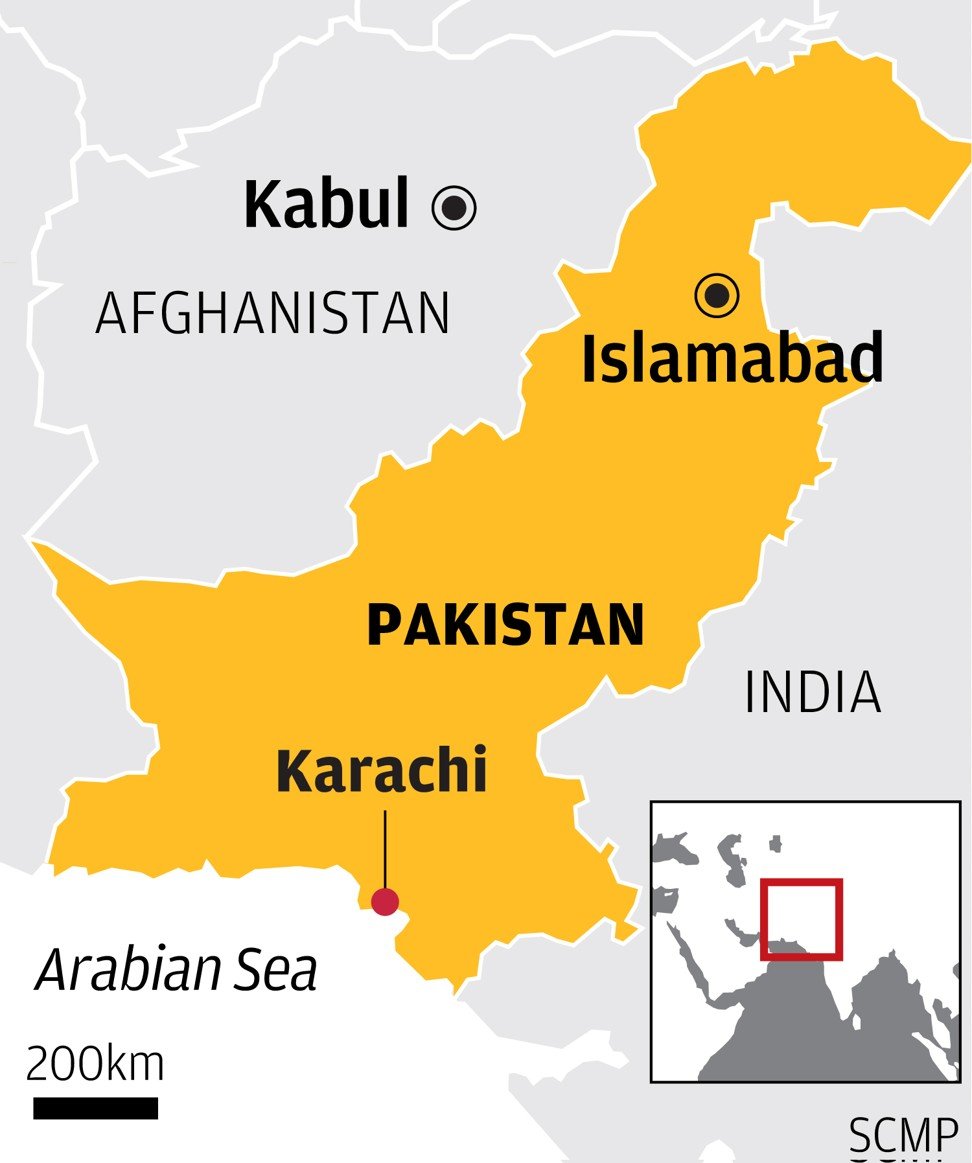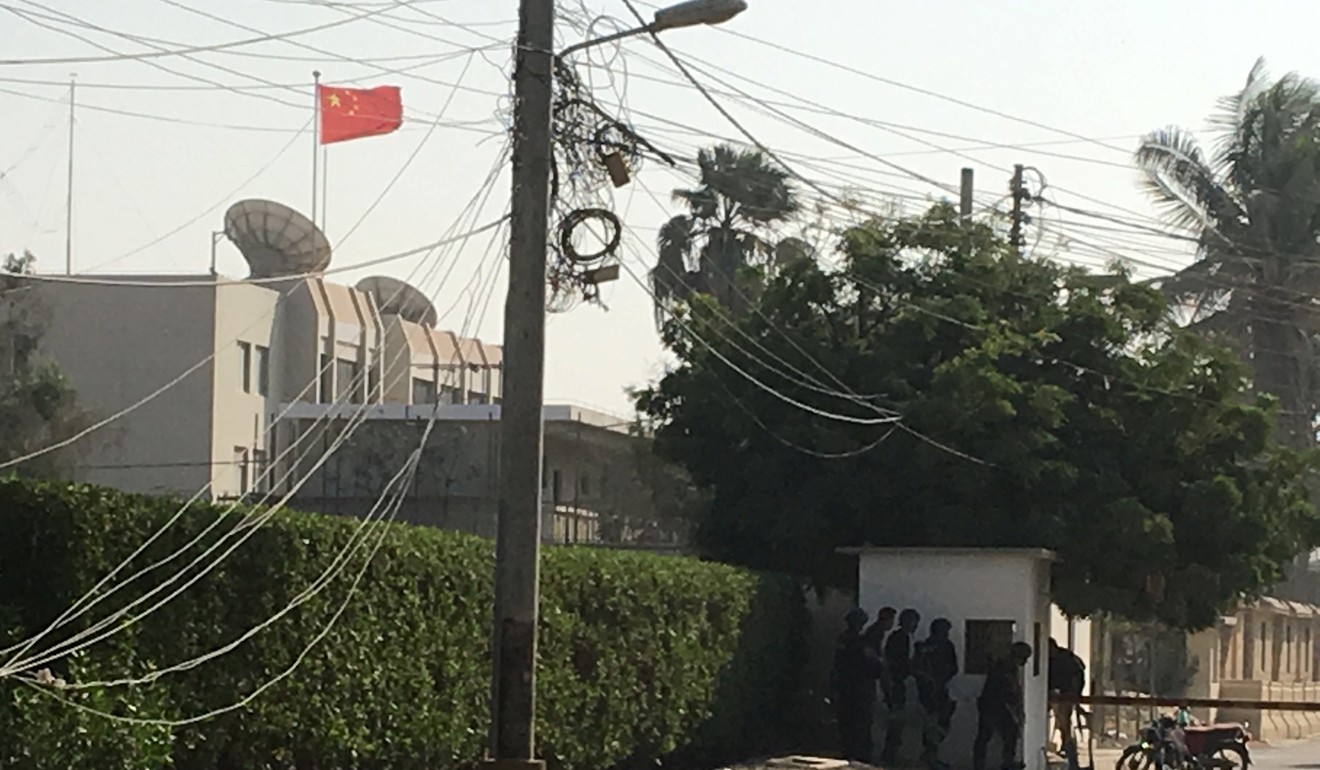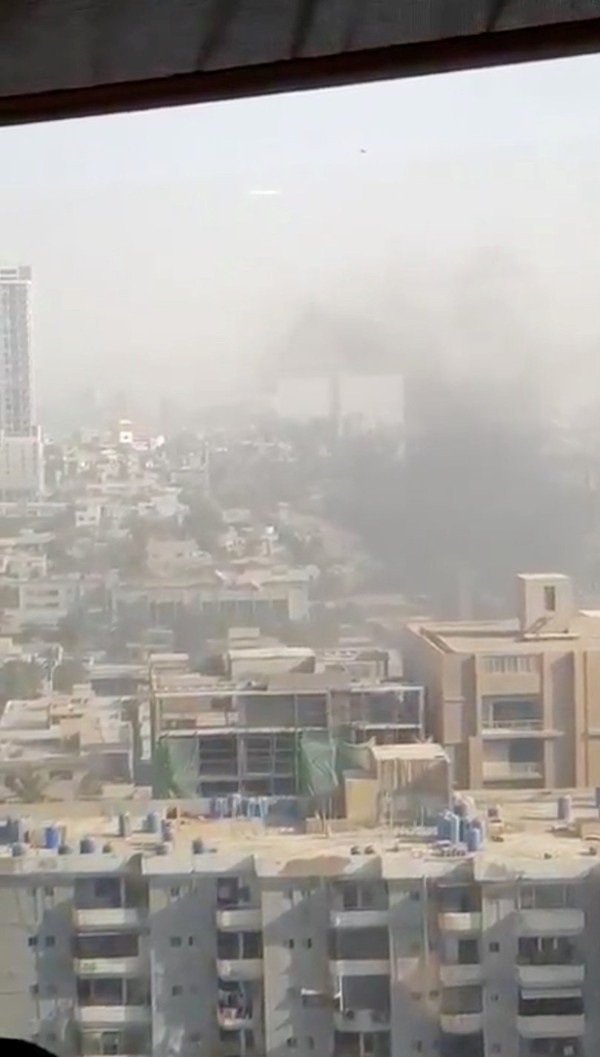
7 killed in attack on Chinese consulate in Karachi claimed by local terrorist group
- Attack claimed by Balochistan Liberation Army, which called Beijing an oppressor that was trying to ‘destroy the future’ of the region
- Chinese Foreign Minister Wang Yi says any attempt to damage the relationship between China and Pakistan will not succeed
Beijing has strongly condemned the attack on the Chinese consulate in the Pakistani city of Karachi on Friday, in which seven people, including two police officers and two civilians, died.
Three gunmen armed with machine guns tried to enter the consulate in the southwestern province of Balochistan about 9.30am, but were intercepted by security guards at a checkpoint, according to the city’s police.
“They were discovered by Pakistani police and there was an exchange of fire,” China’s foreign ministry spokesman Geng Shuang said. “The three militants were shot dead, and two Pakistani security officials died,” he said, adding that all of the consulate staff and their family members were safe.
A Pakistani father and son from Quetta, capital of Balochistan, were later reported to have been killed in the crossfire. The consulate is often busy on a Friday morning as it is the designated time for people to pick up their Chinese visas.
Chinese Foreign Minister Wang Yi said later on Friday that any attempt to damage the relationship between China and Pakistan would fail.
In an emergency telephone call with his Pakistani counterpart, Shah Mehmood Qureshi, he said China believed Pakistan had the ability to maintain stability in the region.
“China is shocked about the militant attack ... and strongly condemns [it],” he was quoted as saying in a foreign ministry statement, adding that Islamabad had notified Beijing immediately after the incident.
“Any attempt to destroy the friendship between China and Pakistan will not succeed,” he said.
China promises more economic aid for Pakistan, but won’t yet commit to specific pledges
Qureshi was quoted as saying that Pakistan would protect Chinese citizens in the country.
The attack was claimed by the Balochistan Liberation Army (BLA), a separatist group that has branded Beijing an oppressor that wants to “destroy the future of Balochistan”.
“China strongly condemns any violent attacks against diplomatic agencies and requests that Pakistan takes practical measures to ensure the safety of Chinese citizens and institutions in the country,” Geng said.

Pakistan’s Prime Minister Imran Khan also condemned the attack, which he described as part of a conspiracy against the economic and strategic cooperation between Islamabad and Beijing.
He said he had ordered an investigation into the attack and said that such incidents would never undermine Pakistan’s relations with China, which are “mightier than the Himalayas and deeper than the Arabian Sea”.
India also issued a strongly worded condemnation of the attack. “There can be no justification whatsoever for any act of terrorism,” the foreign ministry in New Delhi said.

The incident was witnessed by Allah Bakhsh, a security guard at a nearby house. “They [the attackers] were holding Kalashnikovs. First, they hurled a small grenade and then started firing,” he said.
The city’s police chief Ameer Sheikh said two police personnel were killed in the fighting. “There were three attackers and all three have been killed … They could not even get in the compound. They tried to get into the visa section.”
At least one of the attackers was wearing a suicide vest, which did not detonate, another senior police official said. Pictures posted to social media purportedly of the attack showed smoke rising from the area.
Police sources said the terrorists also had supplies of food and medicine strapped to their bodies, suggesting they might have been planning to take hostages and remain in the consulate for some time.
Qureshi said after the attack that all 21 members of the consulate staff had been moved to a safe location.
“The attackers did not hurt any of them, or take any hostages,” he told a news conference in Islamabad.

The attack was the second targeting Chinese nationals in Balochistan in just four months. In August, six people, three of them Chinese nationals, were injured when a bus carrying Chinese engineers was attacked in the area.
Balochistan is at the centre of the massive China-Pakistan Economic Corridor (CPEC), which is a major component of China’s “Belt and Road Initiative”. More than 30,000 Chinese nationals live in Pakistan, and many of them work on projects under the massive infrastructure development plan in which Beijing has invested tens of billions of dollars.
A spokesman for the BLA, also known as Geand Baloch, said: “We carried out this attack and our action is continuing.
“We have been seeing the Chinese as an oppressor, along with Pakistani forces,” he said by telephone from an undisclosed location.
The BLA is one of several militant groups operating in Balochistan, Pakistan’s largest and poorest province, which is rife with ethnic, sectarian and separatist insurgencies.
A Twitter account associated with the group said three of its members had “embraced martyrdom” in the attack on the Chinese consulate. The account was suspended soon after.

China, one of Pakistan’s closest allies, has poured billions of dollars into the South Asian country in recent years as part of a massive infrastructure project that seeks to connect its western Xinjiang region with the Arabian Sea port of Gwadar.
But for Pakistan, plagued by weak institutions, endemic corruption and a range of insurgencies in areas slated to host the corridor, taking part in such a project presents an enormous challenge.
Economic dividends to be gained from the corridor is an extremely sensitive project in some of the areas it will run through – particularly resource-rich Balochistan.
Since the beginning of the project, militants have repeatedly attacked construction sites and targeted Chinese workers.
One person was killed and 45 injured in three separate attacks in Baluchistan on October 19 last year. In the first, 26 Pakistani workers were hurt when an attacker threw a grenade into their hostel in Gwadar. In the second, 15 people were injured when a grenade exploded at a food court in the town of Mastung, near Quetta, and in the third a paramilitary soldier was shot dead and four of his colleagues hurt when a gunman open fire on them.
Bomb hidden in vegetables kills at least 31 in Pakistan market blast near border with Afghanistan
In August, three Chinese nationals were among six people wounded in a suicide attack claimed by the BLA on a bus transporting Chinese engineers working on a mining project in Balochistan.
Mustafa Hyder Sayed, executive director of the Pakistan-China Institute, a non-governmental think tank, said: “We are reminded today that the biggest challenge to the CPEC is that of the security. While no Chinese lives were lost today, the tremors that it sends in existing and future investors is unthinkable. We cannot afford such incidents if we want it to take off.”
Ghulam Mustafa, a retired general with the Pakistan army who now works as a defence industry analyst, said the Karachi attack might have been linked to forces outside Pakistan.
“A crumbling empire in Afghanistan has struck, using its proxies to try and sever the strongest link in China’s belt and road plan,” he said. “It was designed to scare China out of Pakistan. That is their game.”
Islamabad also regularly accuses India of funding and arming Baloch separatists, and of targeting development projects in the province.
Karachi, which is Pakistan’s financial hub, suffered years of disruption at the hands of militant groups, but the situation improved significantly after a crackdown by security forces.
Zhu Feng, a professor with the international relations department at Peking University in Beijing, said the terrorists wanted to send a warning to China about its growing economic influence in the region.
“Maybe by threatening China not to lend more support to Pakistan they hope its influence in Pakistan will decline,” he said.
“China-Pakistan relations will not be affected in any real way, but this is a reminder of the problems China faces n the development of the CPEC, because of Pakistan’s internal political turmoil. Especially in this area, religious and terrorist powers are very active, which is not suitable for China getting involved in economic development on a large scale,” he said.
Additional reporting by Murtaza Solangi in Islamabad, Reuters and Associated Press

